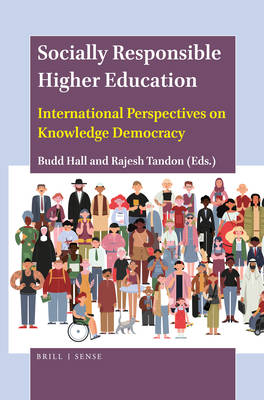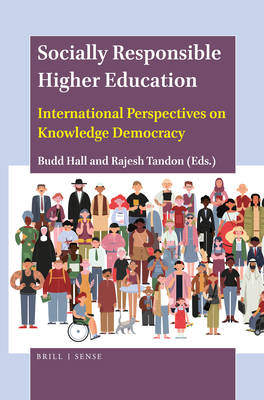
- Afhalen na 1 uur in een winkel met voorraad
- Gratis thuislevering in België vanaf € 30
- Ruim aanbod met 7 miljoen producten
- Afhalen na 1 uur in een winkel met voorraad
- Gratis thuislevering in België vanaf € 30
- Ruim aanbod met 7 miljoen producten
Zoeken
Socially Responsible Higher Education
International Perspectives on Knowledge Democracy
€ 285,45
+ 570 punten
Omschrijving
Listen to the podcast!
Is the university contributing to our global crises or does it offer stories of hope? Much recent debate about higher education has focussed upon rankings, quality, financing and student mobility. The COVID-19 pandemic, the climate crisis, the calls for decolonisation, the persistence of gender violence, the rise of authoritarian nationalism, and the challenge of the United Nations Sustainable Development Goals have taken on new urgency and given rise to larger questions about the social relevance of higher education. In this new era of uncertainty, and perhaps opportunity, higher education institutions can play a vital role in a great transition or civilisational shift to a newly imagined world.
Socially Responsible Higher Education: International Perspectives on Knowledge Democracy shares the experiences of a broadly representative and globally dispersed set of writers on higher education and social responsibility, broadening perspectives on the democratisation of knowledge. The editors have deliberately sought examples and viewpoints from parts of the world that are seldom heard in the international literature. Importantly, they have intentionally chosen to achieve a gender and diversity balance among the contributors. The stories in this book call us to take back the right to imagine, and 'reclaim' the public purposes of higher education.
Is the university contributing to our global crises or does it offer stories of hope? Much recent debate about higher education has focussed upon rankings, quality, financing and student mobility. The COVID-19 pandemic, the climate crisis, the calls for decolonisation, the persistence of gender violence, the rise of authoritarian nationalism, and the challenge of the United Nations Sustainable Development Goals have taken on new urgency and given rise to larger questions about the social relevance of higher education. In this new era of uncertainty, and perhaps opportunity, higher education institutions can play a vital role in a great transition or civilisational shift to a newly imagined world.
Socially Responsible Higher Education: International Perspectives on Knowledge Democracy shares the experiences of a broadly representative and globally dispersed set of writers on higher education and social responsibility, broadening perspectives on the democratisation of knowledge. The editors have deliberately sought examples and viewpoints from parts of the world that are seldom heard in the international literature. Importantly, they have intentionally chosen to achieve a gender and diversity balance among the contributors. The stories in this book call us to take back the right to imagine, and 'reclaim' the public purposes of higher education.
Specificaties
Betrokkenen
- Uitgeverij:
Inhoud
- Aantal bladzijden:
- 332
- Taal:
- Engels
- Reeks:
- Reeksnummer:
- nr. 5
Eigenschappen
- Productcode (EAN):
- 9789004445826
- Verschijningsdatum:
- 6/05/2021
- Uitvoering:
- Hardcover
- Formaat:
- Genaaid
- Afmetingen:
- 155 mm x 235 mm
- Gewicht:
- 678 g

Alleen bij Standaard Boekhandel
+ 570 punten op je klantenkaart van Standaard Boekhandel
Beoordelingen
We publiceren alleen reviews die voldoen aan de voorwaarden voor reviews. Bekijk onze voorwaarden voor reviews.










